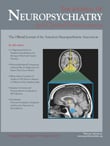Successful Treatment With Amisulpride for Poststroke Psychosis
To the Editor: Among poststroke neuropsychiatric syndromes, depression is most prevalent, but poststroke psychosis with delusions/hallucinations seems to be much rarer. However, a study in Australia found that incidence of poststroke psychosis was 6.7% within a 10-year follow-up period. 1 Here we report a treatment experience of a female stroke survivor who developed psychosis and dementia 2 years after her cerebral infarction.
Case Reports
A woman was referred to the psychiatric outpatient clinic at age 50 with a history of a minor stroke 2 years before. She developed insomnia, restlessness, low mood, and anxiety for 1 year in addition to progressive memory impairment, dysphasia, agnosia, and disorientation. She also suffered from auditory and occasional visual hallucinations. Her personal and family psychiatric history was unremarkable.
On her first visit, a neurological examination revealed a mild left-sided limb weakness. Complete laboratory work-up results were insignificant. A magnetic resonance scan showed multiple tiny T2-hyperintense foci in the bilateral hemispheric white matter, compatible with an old stroke and microvascular disease. She scored 20 on the Mini-Mental State Examination; 83 out of 100 in the Cognitive Ability Screening Instrument; especially poor in short-term memory and language ability in a neuropsychological assessment; and 1.0 on the Clinical Dementia Rating Scale, signifying multiple cognitive function deficits.
She was diagnosed with poststroke psychosis and suspected vascular dementia with psychotic and depressive features. Sulpiride, 50 mg/day, was prescribed, with the dose gradually increasing to 600 mg/day, as well as 50–100 mg of sertraline per day. Three months later, the depression and anxiety improved, but the hallucinations persisted. Sulpiride was shifted to 4 mg of risperidone for 18 months, then up to 20 mg of aripiprazole per day for another half year, due to the lack of response. She continued to experience auditory hallucinations, with vivid human voices, which expressed obscene and sarcastic content. She received up to 600 mg of amisulpride per day. The auditory and visual hallucination symptoms improved 1 month after amisulpride treatment. During the 1-year follow-up period, the patient maintained no psychotic symptoms on a daily dose of 600 mg of amisulpride.
Discussion
Poststroke depression has been reported with persistent psychotic features in two patients with temporal lobe ischemia. 2 In our patient, depression was improved after antidepressant treatment, but psychosis persisted.
We believe that this is the first report about amisulpride for the treatment of poststroke psychosis. Amisulpride, a relatively pure dopamine (D 2 ) antagonist, 4 has been studied for treatment in Alzheimer’s disease with behavior and psychological symptoms of dementia in comparison to risperidone in randomized open trials. 5 Although vascular dementia has been reported, with high percentages of delusions and hallucinations, our patient is relatively younger than the mean age in these studies. 3 Poststroke psychosis is a rare but important neuropsychiatric issue, and the treatment of this disorder needs more evidence and study.
1. Almeida OP, Xiao J: Mortality associated with incident mental health disorders after stroke. Aust N Z J Psychiatry 2007; 41:274–281Google Scholar
2. Ortiz N, Annoni JM, Trojan D, et al: Persistent severe depressive episode with mood-congruent psychotic features associated with left temporal ischemia. Cogn Behav Neurol 2004; 17:157–162Google Scholar
3. Klimkowicz-Mrowiec A, Dziedzic T, Slowik A, et al: Predictors of poststroke dementia: results of a hospital-based study in Poland. Dement Geriatr Cogn Disord 2006; 21:328–334Google Scholar
4. Gerlach J, Peacock L: New antipsychotics: the present status. Int Clin Psychopharmacol 1995; 10(suppl 3):39–48Google Scholar
5. Lim HK, Pae CU, Lee C, et al: Amisulpride versus risperidone treatment for behavioral and psychological symptoms in patients with dementia of the Alzheimer type: a randomized, open, prospective study. Neuropsychobiology 2006; 54:247–251Google Scholar



